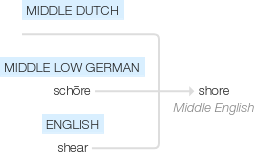Shore
Middle English: from Middle Dutch, Middle Low German schōre ; perhaps related to the verb shear.
wiktionary
From Middle English schore, from Old English *sċora (attested as sċor- in placenames), from Proto-Germanic *skurô(“rugged rock, cliff, high rocky shore”). Possibly related to Old English sċieran(“to cut”), which survives today as English shear.
Cognate with Middle Dutch scorre(“land washed by the sea”), Middle Low German schor(“shore, coast, headland”), Middle High German schorre("rocky crag, high rocky shore"; > German Schorre, Schorren(“towering rock, crag”)), and Limburgish sjaor(“riverbank”). Maybe connected with Norwegian Bokmål skjær.
Borrowed from Middle Dutch schooren(“to prop up, support”) and Middle Low German schore(“to shovel, sweep”). It is of uncertain origin, but has been found in some other Germanic languages. Compare Old Norse skorða(“piece of timber set up as a support”). [1]
See shear.
shore (plural shores)
Perhaps a form of score, or another form of sure, equivalent to assure.
etymonline
shore (n.)
"land bordering a large body of water," c. 1300, from an Old English word or from Middle Low German schor "shore, coast, headland," or Middle Dutch scorre "land washed by the sea," all probably from Proto-Germanic *skur-o- "cut," from PIE root *sker- (1) "to cut."
According to etymologists originally with a sense of "division" between land and water. But if the word began on the North Sea coast of the continent, it might as well have meant originally "land 'cut off' from the mainland by tidal marshes" (compare Old Norse skerg "an isolated rock in the sea," related to sker "to cut, shear"). Old English words for "coast, shore" were strand (n.), waroþ, ofer. Few Indo-European languages have such a single comprehensive word for "land bordering water" (Homer uses one word for sandy beaches, another for rocky headlands). General application to "country near a seacoast" is attested from 1610s.
shore (v.)
mid-14c., "to prop, support with a prop;" of obscure etymology though widespread in Germanic (Middle Dutch schooren "to prop up, support," Old Norse skorða (n.) "a piece of timber set up as a support"). Related: Shored; shoring. Also as a noun, "post or beam for temporary support of something" (mid-15c.), especially an oblique timber to brace the side of a building or excavation.
